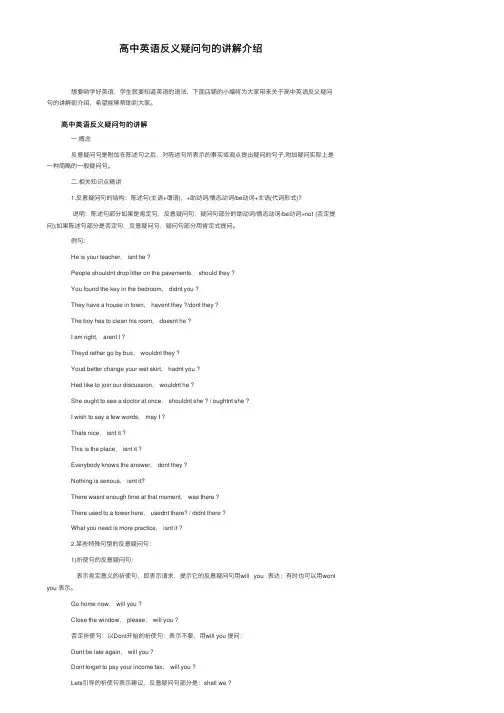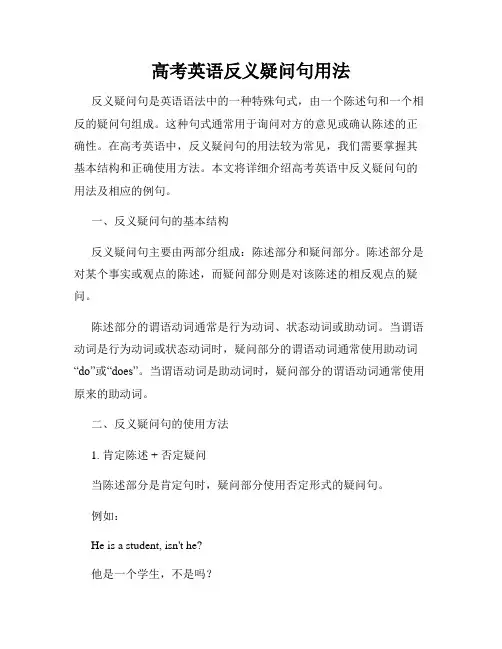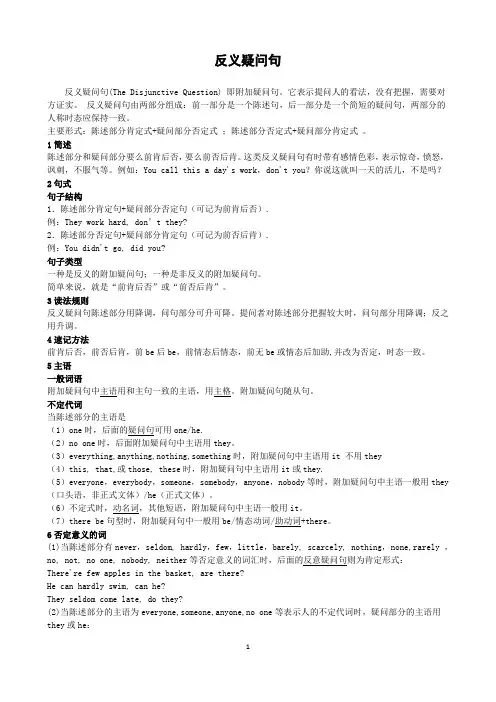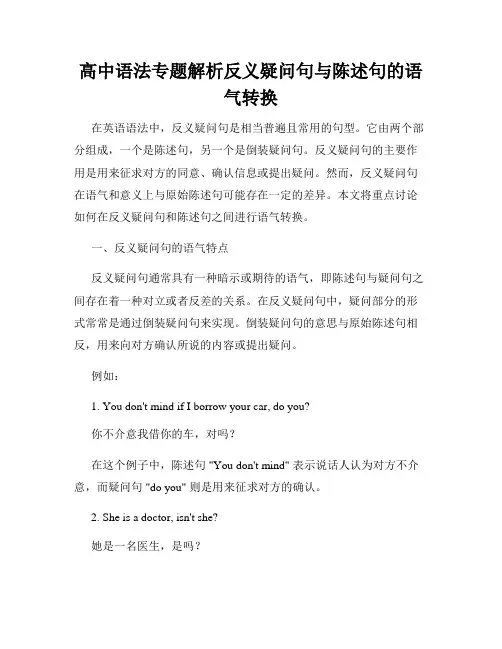高中英语_语法讲解_反义疑问句
高中英语反义疑问句的讲解介绍

⾼中英语反义疑问句的讲解介绍 想要哟学好英语,学⽣就要知道英语的语法,下⾯店铺的⼩编将为⼤家带来关于⾼中英语反义疑问句的讲解街介绍,希望能够帮助到⼤家。
⾼中英语反义疑问句的讲解 ⼀.概念 反意疑问句是附加在陈述句之后,对陈述句所表⽰的事实或观点提出疑问的句⼦.附加疑问实际上是⼀种简略的⼀般疑问句。
⼆.相关知识点精讲 1.反意疑问句的结构:陈述句(主语+谓语),+助动词/情态动词/be动词+主语(代词形式)? 说明:陈述句部分如果是肯定句,反意疑问句,疑问句部分的助动词/情态动词/be动词+not (否定提问);如果陈述句部分是否定句,反意疑问句,疑问句部分⽤肯定式提问。
例句: He is your teacher, isnt he ? People shouldnt drop litter on the pavements, should they ? You found the key in the bedroom, didnt you ? They have a house in town, havent they ?/dont they ? The boy has to clean his room, doesnt he ? I am right, arent I ? Theyd rather go by bus, wouldnt they ? Youd better change your wet skirt, hadnt you ? Hed like to join our discussion, wouldnt he ? She ought to see a doctor at once, shouldnt she ? / oughtnt she ? I wish to say a few words, may I ? Thats nice, isnt it ? This is the place, isnt it ? Everybody knows the answer, dont they ? Nothing is serious, isnt it? There wasnt enough time at that moment, was there ? There used to a tower here, usednt there? / didnt there ? What you need is more practice, isnt it ? 2.某些特殊句型的反意疑问句: 1)祈使句的反意疑问句: 表⽰肯定意义的祈使句,即表⽰请求,提⽰它的反意疑问句⽤will you 表达:有时也可以⽤wont you 表⽰。
高中英语语法:反义疑问句专项讲解(含答案)

反义疑问句一、反义疑问句又叫附加疑问句。
反义疑问句由两部分组成:前一部分是一个陈述句,后一部分是一个简短的疑问句,两部分的人称时态应保持一致。
1.陈述部分为肯定式+ 疑问部分为否定式(如果陈述部分的否定词带有否定前缀,那么,该陈述部分作肯定处理,附加疑问部分一般仍用否定形式)e.g. She was ill yesterday,wasn’t she?Tom dislikes the book,doesn’t he?2.陈述部分为否定式+ 疑问部分为肯定式(陈述部分用no,nothing,nobody,never,few,seldom,hardly,rarely,little等否定或半否定含义的词时,疑问部分用肯定式。
)e.g. He can’t ride a bike,can he?Some plants never blown (开花),do they ?二、附加疑问句(一)主语的选择1.陈述部分的主语是I,疑问部分要用aren't I.I’m as tall as your sister,aren't I?注:当陈述部分的主语是I,而句子又用来征询对方的意见时,附加疑问句中的主语用you。
如:I find English very interesting,don’t you?I don’t like that film,do you?2.当陈述部分的主语是everybody,everyone,someone,nobody,no one,somebody 等合成代词时,附加疑问句中的主语通常用they,亦可用he,如:Somebody phoned while I was out,didn’t they?Everyone enjoyed the party,didn’t they?Nobody wants to go there,does he?3.当陈述部分的主语是不定代词everything,nothing,anything,something时,附加疑问句中的主语一般用it,如:Everything seems all right now,doesn’t it?Nothing is kept in good order,is it?Something must be done to stop pollution,isn’t it?4.当陈述部分的主语是指示代词this,that或these,those时,附加疑问句中的主语分别用it和they,如:This is important,isn’t it?That isn’t correct,is it?These are your friends Tom and Jack,aren’t they?5.如果陈述部分是以代词one作主语,附加疑问句中的主语在正式场合用one,非正式场合下可以用you或he,如:One can’t be too careful,can one?或can you?One should do his duty,shouldn’t he?6.当陈述句为there be结构时,附加疑问句中的主语也用there。
高考英语反义疑问句用法

高考英语反义疑问句用法反义疑问句是英语语法中的一种特殊句式,由一个陈述句和一个相反的疑问句组成。
这种句式通常用于询问对方的意见或确认陈述的正确性。
在高考英语中,反义疑问句的用法较为常见,我们需要掌握其基本结构和正确使用方法。
本文将详细介绍高考英语中反义疑问句的用法及相应的例句。
一、反义疑问句的基本结构反义疑问句主要由两部分组成:陈述部分和疑问部分。
陈述部分是对某个事实或观点的陈述,而疑问部分则是对该陈述的相反观点的疑问。
陈述部分的谓语动词通常是行为动词、状态动词或助动词。
当谓语动词是行为动词或状态动词时,疑问部分的谓语动词通常使用助动词“do”或“does”。
当谓语动词是助动词时,疑问部分的谓语动词通常使用原来的助动词。
二、反义疑问句的使用方法1. 肯定陈述 + 否定疑问当陈述部分是肯定句时,疑问部分使用否定形式的疑问句。
例如:He is a student, isn't he?他是一个学生,不是吗?2. 否定陈述 + 肯定疑问当陈述部分是否定句时,疑问部分使用肯定形式的疑问句。
例如:She doesn't speak French, does she?她不会说法语,对吗?3. 陈述部分有实义动词如果陈述部分有实义动词(非助动词),则疑问部分使用助动词“do”或“does”。
例如:They like playing basketball, don't they?他们喜欢打篮球,对吗?4. 陈述部分有助动词如果陈述部分有助动词,则疑问部分使用原来的助动词。
例如:You can swim, can't you?你会游泳,对吗?5. 以let's开头的陈述句以let's开头的陈述句,疑问部分使用shall we。
例如:Let's go to the park, shall we?我们去公园吧,好吗?三、高考英语中的应用示例1. 完成句子The weather is nice today, ________?天气今天不错,是吗?2. 完成句子Tom isn't coming to the party, ________?汤姆不来参加聚会,是吗?3. 完成句子She will never forget this experience, ________?她永远不会忘记这个经历,对吗?4. 完成句子They have already finished their homework, ________?他们已经完成作业了,是吗?5. 完成句子Let's study harder for the exam, ________?让我们更努力地为考试学习,好吗?总结:反义疑问句是高考英语中的常见语法现象,掌握好其基本结构和正确使用方法对于理解和运用该句式非常重要。
(完整)高中英语反义疑问句(详细)

反义疑问句反义疑问句(The Disjunctive Question) 即附加疑问句。
它表示提问人的看法,没有把握,需要对方证实。
反义疑问句由两部分组成:前一部分是一个陈述句,后一部分是一个简短的疑问句,两部分的人称时态应保持一致。
主要形式:陈述部分肯定式+疑问部分否定式;陈述部分否定式+疑问部分肯定式。
1简述陈述部分和疑问部分要么前肯后否,要么前否后肯。
这类反义疑问句有时带有感情色彩,表示惊奇,愤怒,讽刺,不服气等。
例如:You call this a day's work,don't you?你说这就叫一天的活儿,不是吗?2句式句子结构1.陈述部分肯定句+疑问部分否定句(可记为前肯后否).例:They work hard, don’t they?2.陈述部分否定句+疑问部分肯定句(可记为前否后肯).例:You didn't go, did you?句子类型一种是反义的附加疑问句;一种是非反义的附加疑问句。
简单来说,就是“前肯后否”或“前否后肯”。
3读法规则反义疑问句陈述部分用降调,问句部分可升可降。
提问者对陈述部分把握较大时,问句部分用降调;反之用升调。
4速记方法前肯后否,前否后肯,前be后be,前情态后情态,前无be或情态后加助,并改为否定,时态一致。
5主语一般词语附加疑问句中主语用和主句一致的主语,用主格。
附加疑问句随从句。
不定代词当陈述部分的主语是(1)one时,后面的疑问句可用one/he.(2)no one时,后面附加疑问句中主语用they。
(3)everything,anything,nothing,something时,附加疑问句中主语用it 不用they(4)this, that,或those, these时,附加疑问句中主语用it或they.(5)everyone,everybody,someone,somebody,anyone,nobody等时,附加疑问句中主语一般用they (口头语,非正式文体)/he(正式文体)。
高中语法专题解析反义疑问句与陈述句的语气转换

高中语法专题解析反义疑问句与陈述句的语气转换在英语语法中,反义疑问句是相当普遍且常用的句型。
它由两个部分组成,一个是陈述句,另一个是倒装疑问句。
反义疑问句的主要作用是用来征求对方的同意、确认信息或提出疑问。
然而,反义疑问句在语气和意义上与原始陈述句可能存在一定的差异。
本文将重点讨论如何在反义疑问句和陈述句之间进行语气转换。
一、反义疑问句的语气特点反义疑问句通常具有一种暗示或期待的语气,即陈述句与疑问句之间存在着一种对立或者反差的关系。
在反义疑问句中,疑问部分的形式常常是通过倒装疑问句来实现。
倒装疑问句的意思与原始陈述句相反,用来向对方确认所说的内容或提出疑问。
例如:1. You don't mind if I borrow your car, do you?你不介意我借你的车,对吗?在这个例子中,陈述句 "You don't mind" 表示说话人认为对方不介意,而疑问句 "do you" 则是用来征求对方的确认。
2. She is a doctor, isn't she?她是一名医生,是吗?在这个例子中,陈述句 "She is a doctor" 表示说话人对对方身份的肯定,而疑问句 "isn't she" 则是用来征求对方的确认。
二、反义疑问句与陈述句的语气转换在实际应用中,我们有时需要将一个反义疑问句转换成一个陈述句,或者将一个陈述句转换成一个反义疑问句。
这种语气转换需要注意一些语法规则和用法。
1. 从反义疑问句转换成陈述句当我们将一个反义疑问句转换成一个陈述句时,需要保持与原始陈述句相同的语调和语气。
例如:反义疑问句:You are a student, aren't you?陈述句:You are a student.转换后的陈述句保持了原始陈述句 "You are a student" 的语气,去掉了疑问部分 "aren't you"。
高中英语语法_反意疑问句

(一)特殊情况 (1)陈述部分是I am 时,疑问部分常用 “aren't I?”代替更正式的“am I not? ”。 如: I'm late, aren't I? 我迟到了,是 吗? (2)如陈述部分是“there be”结构时,疑 问部分只需对换there be 的位置即可。如: There's something wrong with your watch, isn't there? 你的手表有毛病,对吗?
但疑问部分仍要用否定式。如:
She dislike it, doesn't she? 她不喜欢它,是吧?
(5)当 neither…nor, both…and 连接陈述 部分的两个主语时,疑问部分的主语常用 复数代词。如:
Both you and I are not wrong, are we? 你和我都不错,是吗?
5.牢记反意疑问句及答语的肯定,否定关系 的一般规则(“+”表示肯定,“—”表示否 定): 问句中:“+,—”或“—,+”。 答句 中:“+,+”或“—,—”。 问中:He doesn't want to buy it, does he? 他不想买它,对吗? 答中:A:Yes, he does. 不,他想买。 B: No, he doesn't. 对,他不想买。
(二)当陈述部分主句的主、谓是 I (We) think(believe, imagine, expect, feel 等)加 that 引导的宾语从句时,疑问部分的主语 (代词)和动词要与从句的一致。如:
I think there is something wrong with the washer, isn't there? 我想洗衣机出了毛病, 对不对?
高中英语知识点归纳反义疑问句的用法
高中英语知识点归纳反义疑问句的用法反义疑问句是英语语法中的重要一部分,通过简短的附加疑问句,可以就前面句子的肯定或否定加以验证或表示对听话者的请求等。
掌握反义疑问句的用法对于高中英语学习来说是至关重要的。
本文将对反义疑问句的用法做一个归纳总结。
一、定义反义疑问句是由一个陈述句和一个简短的疑问句组成,一般由肯定和否定两种形式。
陈述句部分后面的附加疑问句由一个助动词和一个主语构成,其形式与陈述句前面的情态动词或助动词的否定形式相对应。
二、用法1. 如果主句是肯定陈述,附加疑问句部分一般使用否定形式。
例如:- You are a student, aren't you?- He plays basketball, doesn't he?2. 如果主句是否定陈述,附加疑问句部分一般使用肯定形式。
例如:- You don't like coffee, do you?- She hasn't finished her homework, has she?3. 如果主句是祈使句,附加疑问句部分使用will you。
例如:- Please pass me the salt, will you?- Let's go for a walk, will you?4. 如果主句是陈述句的一部分或修饰语从句,整个句子都使用附加疑问句的形式。
例如:- I know he is busy, doesn't he?- It seems that she doesn't like him, does she?三、特殊用法1. 在以Let us或Let's开头的句子中,附加疑问句部分使用shall we。
例如:- Let's go, shall we?2. 在带有never的陈述句中,附加疑问句使用ever。
例如:- He has never been to Paris, has he?3. 反义疑问句有时候用来征求对方的意见、请求等。
高中英语词法专题反意疑问句教案
高中英语词法专题——反意疑问句精品教案一、教学目标1. 让学生掌握反意疑问句的定义和基本结构。
2. 培养学生正确使用反意疑问句进行日常交流的能力。
3. 提高学生对英语词法的理解和运用水平。
二、教学内容1. 反意疑问句的定义:反意疑问句是一种特殊的疑问句,由两部分组成,前一部分是一个陈述句,后一部分是一个简短的疑问句。
2. 反意疑问句的基本结构:肯定陈述句+否定疑问句,或否定陈述句+肯定疑问句。
3. 反意疑问句的分类:根据陈述句的类型,反意疑问句可分为四种类型:简单句、并列句、复合句和含有从句的句子。
4. 反意疑问句的使用规则:根据陈述句的主语、谓语和语境来确定疑问句的形式。
三、教学过程1. 导入:通过一个日常生活中的例子,引导学生思考为什么要使用反意疑问句。
2. 讲解:详细讲解反意疑问句的定义、基本结构和分类。
3. 示范:给出一些例子,展示如何根据陈述句的不同类型来构建反意疑问句。
4. 练习:让学生分组练习,互相构造反意疑问句,并纠正错误。
5. 应用:让学生模拟情景,用反意疑问句进行对话。
四、课后作业1. 复习反意疑问句的定义和基本结构。
2. 分析课后练习中的句子,判断其是否为反意疑问句,并解释原因。
3. 尝试在日常生活和学习中运用反意疑问句,提高自己的英语表达能力。
五、教学评价1. 课堂参与度:观察学生在课堂上的积极参与情况和提问回答情况。
2. 练习完成情况:检查学生课后练习的完成质量,及时纠正错误。
3. 应用能力:通过情景模拟或日常对话,评估学生运用反意疑问句的能力。
六、教学策略1. 采用情景教学法,让学生在实际语境中感受和理解反意疑问句的使用。
2. 运用互动式教学法,鼓励学生积极参与,提高课堂活力。
3. 通过对比分析,让学生明确反意疑问句与普通疑问句的区别。
4. 采用分组练习和角色扮演,提高学生的实践能力。
七、教学资源1. 反意疑问句的PPT课件。
2. 反意疑问句的练习题库。
3. 英语电影片段或短视频,用于情景创设。
牛津高中英语模块一语法---反意疑问句
高一英语语法——反意疑问句一、基本用法与结构反意疑问句由“陈述句+简单疑问句”两部分组成,第一部分提出一种看法,第二部分用来质疑或表示证实。
陈述部分与疑问部分的动词时态和动词性质应保持一致,而且肯定和否定形式彼此相反,即陈述部分为肯定式时,疑问部分用否定式,陈述部分为否定式时,疑问部分用肯定式:He likes English, doesn’t he? 他喜欢英语,不是吗?He doesn’t like Engl ish, does he? 他不喜欢英语,是吗?二、反意疑问句的用法:注意:1.当陈述部分带有否定前缀或后缀的否定词,如dislike, unfair, careless时,作肯定句处理,疑问部分用否定形式。
eg: She dislikes the novel, doesn't she?It's unfair, isn't it?2、当陈述部分的have/has不表示“有”,而表示“进行”、“举行”等,如:have breakfast / lunch, have a meeting,have a talk,疑问部分要用do/does/did,不用have/has/hadeg: They had a good time last night, didn't they?3、当陈述部分中的have/has/had to do sth.表示“不得不做...”时,疑问部分用don’t/doesn’t /didn’t。
eg: She has to stay at home to look after her sick mother, doesn't she?4、当陈述部分含有状语从句时,疑问部分的主语应和主句的主语一致。
eg: When you arrived at the station, the train had left, hadn't it?The train had left, when you arrived at the station, hadn't it?5、当陈述部分是并列(常用并列连词:so, and, but, or, for)反意部分和第二个分句一致eg: Mary is a good student, but she often comes to school late, doesn't she?6、当陈述部分的主语是one时,反意部分的主语也用one或he。
高考干货之“反义疑问句”高考英语精讲——语法(十一)
高考干货之“反义疑问句”高考英语精讲——语法(十一)反意疑问句是一种常用于口语的疑问句,这种问句由两部分组成,前一部分是陈述句,后一部分是附加的简短问句,中间用逗号隔开,因此,反意疑问句又称附加疑问句。
如果陈述句是肯定句,附加问句用否定句;如果陈述句是否定,附加问句用肯定句,即“前肯后否,前否后肯”。
附加问句一般为“be动词(助动词、情态动词)+代词”构成,如:They didn’t clean the classroom yesterday, did they?他们昨天没有扫扫教室,是吗?You’re coming,aren’tyou? 你会来的,不是吗?含有特殊主语的反意疑问句反意疑问句部分主语与谓语的确定应以陈述部分的主语和谓语为依据,尤其要注意一些特殊的情况,同时,反意疑问句部分的主语一般应用人称代词,而动词若为否定形式则一般应用缩略形式。
1.陈述句的主语是不定代词时,如果是表示物的everything,anything,something,nothing时,反意疑问句的主语用it,谓语动词用单数,如果是表示人的everybody,everyone,somebody,someone,anybody,anyone,nobody,no one时,反意问句的主语可用they,也可用he,谓语动词用相应的单、复数,如:Nothing is serious, is it? 没什么严重的,是吗?No one was hurt, were they? 没有人受伤,是吗?Everybody knows what I said,don’t they?每个人都懂了我所说的,是吗?Everyone knows his job, doesn’t he?每个人都了解他的工作,是吗?2.如果陈述部分的主语是指示代词this,that时,疑问句的主语用it,谓语用单数形式;如果陈述部分的主语是指示代词these,those,则疑问句的主语用they,谓语用复数形式,如:This is very important, isn’t it?这是非常重要的,是吗?These are cups, aren’t they?这些是茶杯,是吗?3. 陈述部分的主语是从句、不定式或动名词时,疑问部分的主语用it,谓语用单数,如:What you said is wrong, isn’t it?你说的错了,不是吗?To learn English well isn’t easy, is it?学好英语不容易,是吗?Practising speaking English every morning will do you good, won’t it?每天早上练习说英语对你有好处,不是吗?含有特殊动词的反意疑问句1.如果陈述句中有系动词或情态动词或助动词,附加疑问句中用与它相应的肯定或否定形式即可;如果没有,就要根据陈述句的时态选择适当的助动词,如:Tom has finished his homework, hasn’t he?汤姆己经完成了他的家庭作业,是吗?She went to Shanghai yesterday, didn’t she?她昨天去上海了,是吗?2. 陈述句是I am…结构,反意问句用aren’t I 或am not I,如:I’m right, aren’t I?我是正确的,对吗?I’m late, a m not I?我迟到了,是吗?3.陈述句中的谓语动词是there be,后边的疑问部分也用there be形式,如:There is an apple on the table, isn’t there?桌子上有只苹果,是吗?There’re some trees on the island, aren’t there?小岛上有一些树,是吗?4.陈述句中的谓语动词为have/has to/had to时,其疑问部分的谓语动词应用don’t /doesn’t/didn’t,如:He has to get up at four tomorrow, doesn’t he?他明天不得不4点钟起床,是吗?They had to leave early, didn’t they?他们不得不早些离开,是吗?5.当陈述部分有dare或need时,若dare和need为实义动词,疑问部分的谓语动词用do的适当形式;若dare和need为情态动词,疑问部分用dare或need构成,如:We need to do it, don’t we?我们需要做这种事,是吗?You daren’t go there, dare you?你不敢去那里,是吗?6. 含有情态动词must的句子1). 若陈述句中强调对现在的情况的推测,疑问部分用aren’t/isn’t+主语,如:You must be tired, aren’t you?你一定很累了吧,对吗?2).陈述句中谓语动词是must have+过去分词时,若陈述句中强调过去情况的推测(一般有过去时间状语),疑问部分的谓语动词用didn’t +主语,如:He must have met her yesterday, didn’t he?他想必是昨天下午见过她了,是吗?3). 若陈述句中强调动作的完成,疑问部分的谓语动词用haven’t/hasn’t+主语,如:You must have seen the film, haven’t you?你想必是看过这部电影,是吗?4). 若陈述部分的must表示“有必要”时,附加疑问句的部分则用needn’t,如:You must go home right now, needn’t you?你有必要马上回家,是吗?5). 当mustn’t表示禁止时,附加疑问部分一般用may,如:You mustn’t walk on grass, may you?不许在草地上走,知道吗?特殊句式中的反意疑问句1.陈述句句中有hardly,seldom,rarely,no,nothing,never,little,few,nobody,nowhere,barely,neither,too…to等表示否定意义的词时,反意问句用肯定形式,如:You will never forget it, will you?你永远不会忘记这件事,是吗?There is nothing on the table, is there?桌子上什么也没有,是吗?She has few friends, does she?她几乎没有朋友,是吗?2. 祈使句的反意疑问句,一般在句尾加will you,如:Give me a hand, will you? 帮帮我,好吗?Stop that noise, will you? 别吵了,行不行?Don’t forget it, will you? 别忘了它,好吗?Don’t talk any more, will you? 别再说话了,好吗?3. let’s开头的祈使句的反意疑问句用shall we;let us开头的祈使句的反意疑问句用will you,如:Let’s go there, shall we?Let us go there, will you?我们去那里,好吗?4. 主从复合句的附加问句1). 复合句的反意疑问句一般是根据主句的主语和谓语形式构成反意疑问部分的,如:He said that we were happy, didn’t he?他说那时我们很开心,没说过吗?2).复合句的主句是I think(expect,suppose,believe,suspect,imagine)时,附加问句要根据主句而定,主语是第一人称时,要根据从句而定,主语为第二、三人称时,与主句保持一致,并且要注意否定的转移,如:I suppose he is serious, isn’t he?我想他很严肃,是吗?I don’t think he is the suitable man for the job, is he?我认为他不是做那项工作的合适人选,不是吗?You think she is a good teacher, don’t you?你认为她是一个好老师,是吗?Your brother thinks you can do the job well, doesn’t he?你弟弟认为你能把这项工作做好,不是吗?5. 并列复句的反意疑问句这种反意疑问句,其疑问部分一般与最接近的分句的主、谓语保持一致,如:We must start at once or we can’t get there on time, can we?我们必须马上出发,否则我们将不能按时到达那里了,对吗?He is a teacher but his wife isn’t a teacher, is she?他是老师,他妻子不是,对么?易错点:1. 陈述句谓语动词是wish,表示征求意见时,反意问句用may,如:I wish to have another piece of cake, may I?我想再要一块蛋糕,可以吗?I wish to go home now, may I?我想现在就回家,可以吗?2. 反意疑问句的答语1). 反意疑问句的答语一般由yes或no引导的简略答语来回答,但是要注意时态及代词的呼应,如:---She is your teacher, isn’t she? 她是你的老师,是吧?---Yes, she is. 是的,她是。
- 1、下载文档前请自行甄别文档内容的完整性,平台不提供额外的编辑、内容补充、找答案等附加服务。
- 2、"仅部分预览"的文档,不可在线预览部分如存在完整性等问题,可反馈申请退款(可完整预览的文档不适用该条件!)。
- 3、如文档侵犯您的权益,请联系客服反馈,我们会尽快为您处理(人工客服工作时间:9:00-18:30)。
反义疑问句1.陈述部分的主语是this, that时,疑问部分的主语多用it;陈述部分的主语是these, those时,疑问部分的主语多用theyThis is a dictionary, isn’t it? Those are shelves, aren’t they?2.当陈述部分是there be结构,疑问部分用there做主语There will not be any trouble, will there?3.陈述部分有neither, none, nobody, nothing, few, little, never, hardly, seldom否定词在句中,后面用肯定疑问句短语构成反义疑问句。
Neither of you will have coffee, will you?Nobody understood his speech, did they?4.陈述部分主语是everyone, everybody, someone, somebody, no one, nobody, anybody,anyone等不定代词,其反义疑问部分的主语可用he,也可以用they5.陈述部分主语是one,反义疑问句的主语可用one或he6.陈述部分主语是something, everything, nothing, anything 等不定代词做主语时,反义疑问句的主语要用it7.当主句主语为第一人称时,动词为suppose, think, believe, suspect, imagine, guess时其后面的翻译疑问句的主语则应与宾语从句的主语一致I don’t think you can do these exercises alone, can you?当主句主语为二三人称,其后的反义疑问句的主语则应与主句的主语一致You thought they could have completed the project, didn’t you?8.当陈述部分是并列句,反义疑问句部分和第二分句相匹配Mary is a good girl but she often comes to school late, doesn’t she?9.翻译疑问句的陈述部分含有un-, im-, in-, dis-等否定意义的前缀构成的词语时,陈述部分被视为肯定含义,问句部分用否定形式It’s impossible to learn English without remembering more words, isn’t it?10.当陈述部分带有情态动词must时,如表示“必须”,附加问句用must, 如表示猜测,附加问句根据具体语境用适当的形式He must finish the homework, mustn’t he?He must be very tired, isn’t he?11.祈使句后的附加疑问句用will you,但是let’s引导的祈使句后面用shall we12.特殊情况I am very lucky, aren’t I ?We used to be ashamed of the way we look, usedn’t we?/didn’t we?She has a book, hasn’t he?/doesn’t he?I wish to have a drink, may I ?They ought to go there, shouldn’t they? oughtn’t they?He would rather read it yesterday, wouldn’t he?You’d better take his advice, hadn’t you?You’d like to go with me, wouldn’t you?We have to get there, don’t we?语法填空之反意疑问句(学生版)完成下列句子1、Few of them hurt themselves in the accident last night, ___________ ?2.--You’ve never seen dinosaur egg s, have you ?--_______________. How I wish to visit the Dinosaur World.3、His sister had a bad cough, _________she?4、Mr. Green went to Shenzhen on business last week, ________?5. John can hardly understand any Chinese, _________he?6、Don’t smoke in the meeting-room, _________?7、Lucy, you clean the blackboard today, _______ ?8. Miss Cheng will never forget her first visit to Canada ,________?9、The lady couldn’t say a word when she saw the snake,__________?10、__________the population of china? 1,300,000,000.11、---______I go and meet you at the airport?---No ,thanks, dear . I can take a taxi home.12、------________is the Confucian Temple(孔庙) from here?------It’s about 10 minutes’ walk.13、-----_________may I keep these books?-----two weeks.14、Tina is unhappy now, ____________?15、---You won’t follow his example, will you ?---________________, I don’t think he is right.16、----__________do you go to Hong Kong?----sorry , I’ve never been there.17、---The boy has to stay at home to look after his little sister,_________?---Yes, because his mother has gone shopping.18、----You lent me some money a few months ago.-----_________? I don’t remember lending you any money .19、My uncle has never been to a foreign country,_____________?20、There is some water in that bottle, ___________?21、----_____________will the foreign students be back from NanJing?----In two days, I think .22、---Let’s go and play football,__________?---That’s wonderful.23. I don’t think that the necklace is made of diamond, __________?24. His wife had the carpets and the curtains cleaned, ____________?25. It’s my son’s wedding next week, and I have to do my best for that,__________?26. Harry wouldn’t become a teacher if it hadn’t been for the holiday, __________?27. No one left here yesterday,_____________?28. Birds rarely build nests in our garden,_____________?29. You must have been to the Great Wall, ____________?30. Learning how to repair motors takes a long time, _____________?31. They must have stayed at home last night,____________?32. There’s not much news in today’s newspaper, _____________?33. They need our help badly at the moment, ______________?34. She is unfit for the position, _____________?35. I wish to visit America, _____________?36. She’s been a worker here for many years, ______________?37. What beautiful flowers, ______________?38. Mother used to live in a poor village, ____________?39.You’d better go at once, _____________?40.I am very interested in Mark Twain’s novels, ____________?41. He never gets up late , ?42. Don’t go out ,?43. Everything begins to grow in spring, ?44. He can hardly finish the work, ?45. Let us go home , ?46. You think he is a good student, ?47. Nobody knows where she lives, ?48. Few students can answer the question, ?49. You needn’t attend the meeting, ______________________?50. We need to come on Sunday, ________________?语法填空之反意疑问句(学生版)完成下列句子1、Few of them hurt themselves in the accident last night, ___________ ?2.--You’ve never seen dinosaur eggs, have you ?--_______________. How I wish to visit the Dinosaur World.3、His sister had a bad cough, _________she?4、Mr. Green went to Shenzhen on business last week, ________?5. John can hardly understand any Chinese, _________he?6、Don’t smoke in the meeting-room, _________?7、Lucy, you clean the blackboard today, _______ ?8. Miss Cheng will never forget her first visit to Canada ,________?9、The lady couldn’t say a word when she saw the snake,__________?10、__________the population of china? 1,300,000,000.11、---______I go and meet you at the airport?---No ,thanks, dear . I can take a taxi home.12、------________is the Confucian Temple(孔庙) from here?------It’s about 10 minutes’ walk.13、-----_________may I keep these books?-----two weeks.14、Tina is unhappy now, ____________?15、---You won’t follow his example, will you ?---________________, I don’t think he is right.16、----__________do you go to Hong Kong?----sorry , I’ve never been there.17、---The boy has to stay at home to look after his little sister,_________?---Yes, because his mother has gone shopping.18、----You lent me some money a few months ago.-----_________? I don’t rem ember lending you any money .19、My uncle has never been to a foreign country,_____________?20、There is some water in that bottle, ___________?21、----_____________will the foreign students be back from NanJing?----In two days, I think .22、---Let’s go and play football,__________?---That’s wonderful.23. I don’t think that the necklace is made of diamond, __________?24. His wife had the carpets and the curtains cleaned, ____________?25. It’s my son’s wedding next week, and I have to do my best for that,__________?26. Harry wouldn’t become a teacher if it hadn’t been for the holiday, __________?27. No one left here yesterday,_____________?28. Birds rarely build nests in our garden,_____________?29. You must have been to the Great Wall, ____________?30. Learning how to repair motors takes a long time, _____________?31. They must have stayed at home last night,____________?32. There’s not much news in today’s newspaper, _____________?33. They need our help badly at the moment, ______________?34. She is unfit for the position, _____________?35. I wish to visit America, _____________?36. She’s been a worker here for many years, ______________?37. What beautiful flowers, ______________?38. Mother used to live in a poor village, ____________?39.You’d better go at once, _____________?40.I am very interested in Mark Twain’s novels, ____________?41. He never gets up late , ?42. Don’t go out ,?43. Everything begins to grow in spring, ?44. He can hardly finish the work, ?45. Let us go home , ?46. You think he is a good student, ?47. Nobody knows where she lives, ?48. Few students can answer the question, ?49. You needn’t attend the meeting, ______________________?50. We need to come on Sunday, ________________?语法填空之反意疑问句(教师版)完成下列句子1、Few of them hurt themselves in the accident last night, ___________ ? did they2.--You’ve never seen dinosaur eggs, have you ?No, Ihaven’t--_______________. How I wish to visit the Dinosaur World.3、His sister had a bad cough, _________she? didn’t4、Mr. Green went to Shenzhen on business last week, ________? didn’t he5. John can hardly understand any Chinese, _________he? can6、Don’t smoke in the meeting-room, _________? will you7、Lucy, you clean the blackboard today, _______ ?will you8. Miss Cheng will never forget her first visit to Canada ,________? will she9、The lady couldn’t say a word when she saw the snake,__________? could she10、__________the population of china? 1,300,000,000. What’s11、---______I go and meet you at the airport? Shall---No ,thanks, dear . I can take a taxi home.12、------________is the Confucian Temple(孔庙) from here? How far------It’s about 10 minutes’ walk.13、-----_________may I keep these books? How long-----two weeks.14、Tina is unhappy now, ____________? isn’t she15、---You won’t follow his example, will you ?---________________, I don’t think he is right.No, I won’t16、----__________do you go to Hong Kong? How often----sorry , I’ve never been there.17、---The boy has to stay at home to look after his little sister,_________? doesn’t he---Yes, because his mother has gone shopping.18、----You lent me some money a few months ago.-----_________? I don’t remember lending you any money . Did I19、My uncle has never been to a foreign country,_____________? has he20、There is some water in that bottle, ___________? isn’t there21、----_____________will the foreign students be back from NanJing?----In two days, I think . How soon22、---Let’s go and play football,__________? shall we---That’s wonderful.23. I don’t think that the necklace is made of diamond, __________? is it24. His wife had the carpets and the curtains cleaned, ____________? didn’t she25. It’s my son’s wedding next week, and I have to do my best for that,__________? don’t I26. Harry wouldn’t become a teacher if it hadn’t been for the holiday, __________? would he27. No one left here yesterday,_____________? did they28. Birds rarely build nests in our garden,_____________? do they29. You must have been to the Great Wall, ____________? haven’t you30. Learning how to repair motors takes a long time, _____________? doesn’t it31. They must have stayed at home last night,____________? didn’t they32. There’s not much news in today’s newspaper, _____________? is there33. They need our help badly at the moment, ______________? don’t they34. She is unfit for the position, _____________?isn’t she35. I wish to visit America, _____________? may I36. She’s been a worker here for many year s, ______________? hasn’t she37. What beautiful flowers, ______________? aren’t they38. Mother used to live in a poor village, ____________? usedn’t she/didn’t she39.You’d better go at once,_____________? hadn’t you40.I am very interested in Mark Twain’s novels,____________? aren’t I41. He never gets up late , ?does he42. Don’t go out ,?will you43. Everything begins to grow in spring, ?doesn’t it44. He can hardly finish the work, ?can he45. Let us go home , ?will you46. You think he is a good student, ? don’t you47. Nobody knows where she lives, ? dothey/does he48. Few students can answer the question, ? can they49. You needn’t attend the meeting, ______________________? need you50. We need to come on Sunday, ________________? do n’t we。
